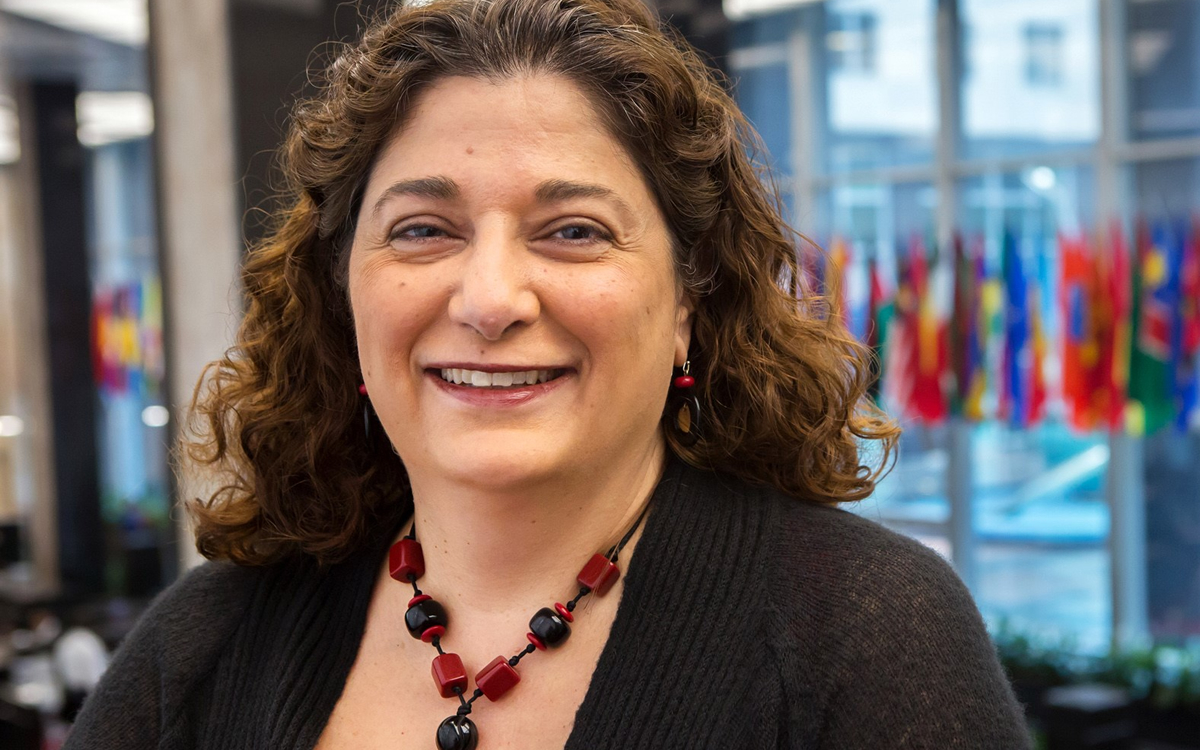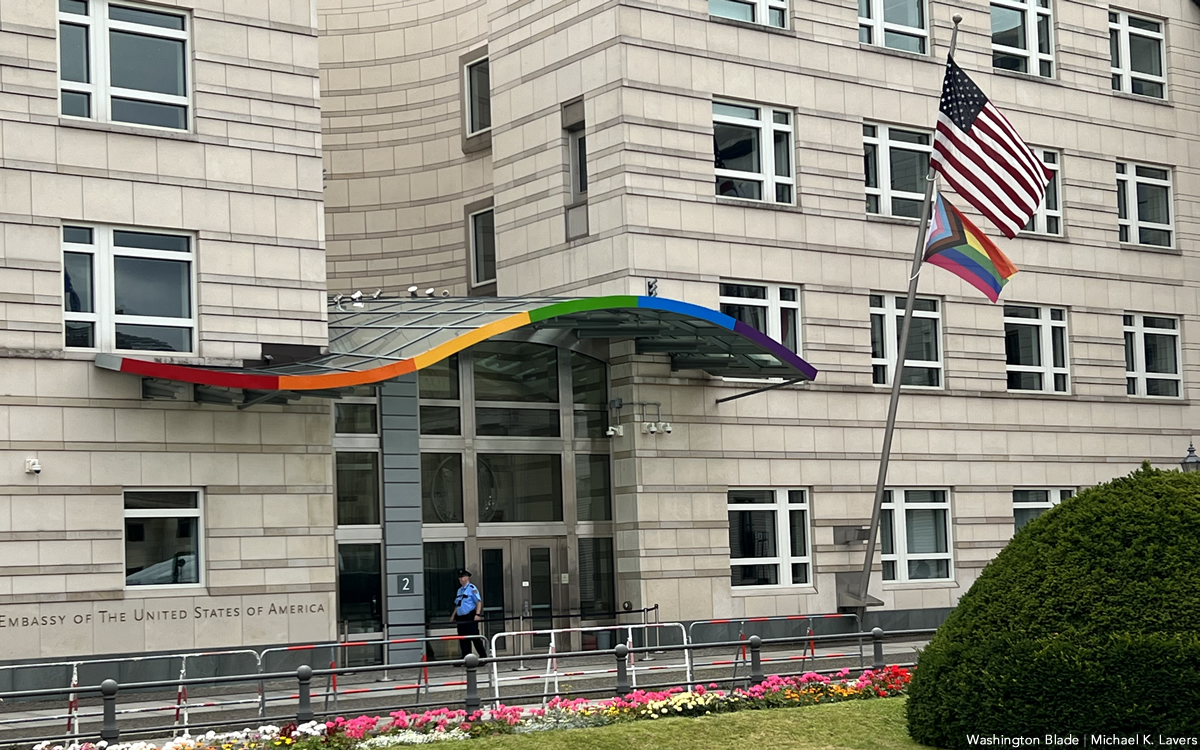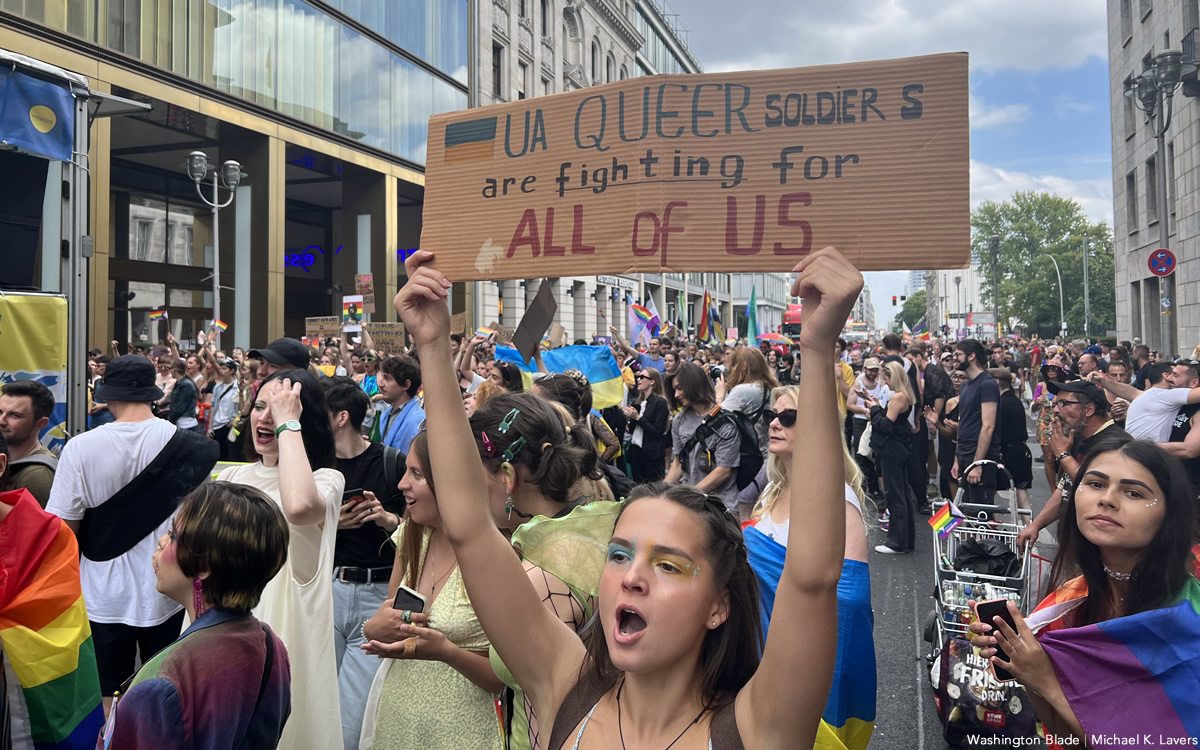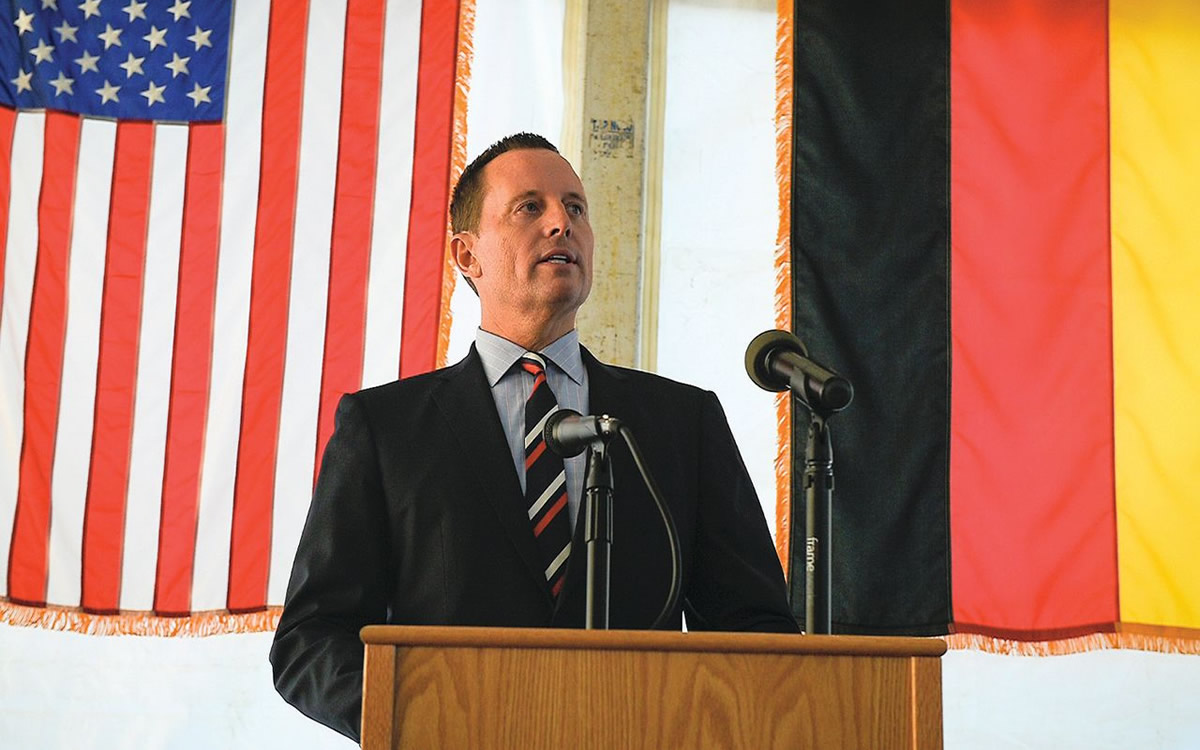Europe
U.S. diplomat praises Germany policy towards Ukrainian refugees
Embassy Cultural Attaché Cherrie Daniels spoke with Blade on July 22

BERLIN — The cultural attaché at the U.S. Embassy in Germany has applauded the German government’s efforts to welcome Ukrainians who have sought refuge in the country.
“The German government and the municipalities and the 16 states have been extremely welcoming of Ukrainian refugees in Germany,” Cherrie Daniels told the Washington Blade on July 22 during a virtual interview from the embassy in Berlin.
More than 900,000 Ukrainians have arrived in Germany since the war began on Feb. 24.
Ukrainians are able to enter Germany without a visa.
Ukrainians, Russians, Iranians, Syrians, Algerians, Ghanaians and people from more than a dozen other countries attended a roundtable on LGBTQ and intersex refugees the embassy co-hosted with the Canadian Embassy in Germany on July 19. ORAM Executive Director Steve Roth and representatives of Germany’s Lesbian and Gay Association, Queer Refugees Deutschland, Human Rights Watch, Quarteera and Miles also participated.
“We can and must promote the protection of vulnerable LGBTQI+ refugees and asylum seekers,” said U.S. Ambassador to Germany Amy Gutmann. “These people are the most vulnerable of the vulnerable and we can and we must respond to human rights abuses. And we can and we must engage international organizations on the human rights of LGBTQI+ persons.”
Daniels said one of the issues roundtable participants discussed was “making sure that asylees get appropriate legal counseling before their asylum hearing.”
“Every country, including the United States and Germany, could do better,” she told the Blade.
Daniels added the roundtable’s overall goal was “to listen to what (participants’) challenges are in the countries they come from.”
“Our job is to listen to what those challenges are and see what our embassies in those regions or what the State Department at-large in the White House can do to support their additional inclusion and equal rights for them,” she said.
Daniels spoke with the Blade a day before Berlin’s annual Christopher Street Day parade took place.
The embassy, which is adjacent to Berlin’s Brandenburg Gate. was flying several Progress Pride flags in the days leading up to the parade. The canopy over the embassy’s main entrance was also adorned in rainbow colors.

The embassy — along with the U.S. Consulates in Frankfurt, Düsseldorf, Leipzig, Hamburg and Munich — on July 6 hosted a discussion about LGBTQ and intersex issues in sports. Former Washington Spirit player Joanna Lohman, Portland Thorns coach Nadine Angerer and former German soccer player Marcus Urban participated.
Lohman is a lesbian, while Angerer and Urban are openly bisexual and gay respectively.
The embassy has also launched “UnterFreunden,” a podcast with an episode that highlights LGBTQ+ and intersex issues.
“What we wanted to assure is that we don’t only celebrate Pride during Pride Month, in June or July in Germany,” Jesse George, the embassy’s public diplomacy and media advisor, told the Blade during the interview with Daniels. “So we are amplifying and doing outreach regarding the LGBTQI+ community all year long.”

President Joe Biden in February 2021 signed a memo that committed the U.S. to promoting LGBTQ and intersex rights abroad as part of his administration’s overall foreign policy. The White House in the same year named Jessica Stern, who was previously the executive director of OutRight Action International, as the next special U.S. envoy for the promotion of LGBTQ and intersex rights abroad.
The State Department in April began to issue passports with “X” gender markers. Stern during an exclusive interview with the Blade ahead of Pride Month noted the Biden administration’s continued support of LGBTQ and intersex rights abroad also includes marriage equality in counties where activists say it is possible through legislative or judicial processes.
“When together we stand up for LGBTQI+ persons, we stand up for the work of building a country and a world where everyone belongs and everyone’s rights are respected, no matter who they are or who they love,” said Gutmann during the July 19 reception.
The U.S. Supreme Court on June 24 struck down Roe v. Wade.
Justice Clarence Thomas in his concurrent opinion said the Supreme Court should reconsider the decisions in the Obergefell and Lawrence cases that extended marriage equality to same-sex couples and the right to private, consensual sex.
The Respect for Marriage Act, which would codify marriage equality into federal law, passed in the U.S. House of Representatives last month with 47 Republicans voting in favor of it. The bill needs 60 votes in the U.S. Senate to overcome a potential filibuster.
Daniels said the Roe ruling is “definitely” on the minds of LGBTQ and intersex activists in Germany and “on our mind.”
“What we can do as an administration is to stand in solidarity with those marginalized communities and, of course, for women’s and girls’ rights and for reproductive rights globally,” she said. “That is something we can do as a State Department, as a foreign policy agency.”
Richard Grenell represented U.S. in Berlin from 2018-2020
Former U.S. Ambassador to Germany Richard Grenell, who is openly gay, represented the U.S. in Berlin from 2018-2020.
The previous administration tapped Grenell to lead an initiative that encourages countries to decriminalize consensual same-sex sexual relations. The Blade last August filed a lawsuit against the State Department in federal court in D.C. that seeks Grenell’s emails about the initiative.
The embassy during Grenell’s ambassadorship hosted a group of LGBTQ and intersex rights activists from around the world. Grenell and then-U.S. Ambassador to the U.N. Kelly Knight Craft in 2019 organized an event on the sidelines of a U.N. Security Council meeting that focused on decriminalization efforts around the world.

Grenell, among other things, faced condemnation from politicians in Germany who accused him of supporting far-right politicians and attempting to interfere in German politics. Advocacy groups in the U.S. and around the world also sharply criticized Grenell over his outspoken support of then-President Donald Trump.
Daniels did not specifically discuss Grenell during the interview. Daniels said in reference to the embassy’s work in support of LGBTQ and intersex rights that “people had been invited to the embassy in that period for certain public events.”
“Now having our doors wide open and showing this inclusive face of the United States, you know, I’ll let other people draw that contrast,” she said.
“In these four walls so to speak, we’re hearing, we’re listening and steering to the extent we can, sharing our policies and programs in a way that will address how can we improve that message of inclusion and of equal rights as LGBTQ rights or human rights,” added Daniels. “It’s not some niche issue. It’s mainstreamed into all of our policies.”
Daniels further stressed “that’s a difference that you’re going to see.”
“Again, it’s not flying the flag on Pride Month, although that’s wonderful,” she said. “It’s fighting for those rights, and all of our programs and all of our outreach and ensuring that that’s human rights. It’s not something that’s just for a particular, you know, trying to show that we do it. I think people can feel that inclusion when they’re in the company of this embassy.”
European Union
European Parliament resolution backs ‘full recognition of trans women as women’
Non-binding document outlines UN Commission on the Status of Women priorities

The European Parliament on Feb. 11 adopted a transgender-inclusive resolution ahead of next month’s U.N. Commission on the Status of Women meeting.
The resolution, which details the European Union’s priorities ahead of the meeting, specifically calls for “the full recognition of trans women as women.”
“Their inclusion is essential for the effectiveness of any gender-equality and anti-violence policies; call for recognition of and equal access for trans women to protection and support services,” reads the resolution that Erin in the Morning details.
The resolution, which is non-binding, passed by a 340-141 vote margin. Sixty-eight MPs abstained.
The commission will meet in New York from March 10-21.
A sweeping executive order that President Donald Trump signed shortly after he took office for a second time on Jan. 20, 2025, said the federal government’s “official policy” is “there are only two genders, male and female.” The Trump-Vance administration has withdrawn the U.S. from the U.N. LGBTI Core Group, a group of U.N. member states that have pledged to support LGBTQ and intersex rights, and dozens of other U.N. entities.
Russia
Russia’s anti-LGBTQ crackdown takes absurd turn
Authorities targeted one of the country’s largest bookstore chains last month

While MAGA continues to attack LGBTQ rights in the U.S. — including erasing queer history and removing children’s books with LGBTQ characters from libraries and pushing an ever‑broader censorship agenda — and as the UK faces MAGA‑inspired campaigns demanding the removal of LGBT literature from public libraries, Russia’s assault on LGBTQ‑related media has taken an extreme and frankly absurd turn. It is a cautionary tale for Western countries of just how far censorship can go once it becomes normalized. From books to anime, TV shows, and even academia, queer existence is being systematically erased.
In January, one of Russia’s largest private bookstore chains, Chitai‑Gorod-Bukvoed, faced the risk of being shut down over alleged “LGBT propaganda” under a law that prohibits any positive mention of LGBTQ content and equates LGBTQ material with pornography and pedophilia.
Among the books targeted were “Beartown,” “Us Against You,”and “The Winners”by Fredrik Backman, “The Left Hand of Darkness” by Ursula K. Le Guin, and “The Heart’s Invisible Furies” by John Boyne.
According to Chitai‑Gorod-Bukvoed CEO Alexander Brychkin, once it became known in mid‑December that law enforcement agencies had launched inspections, the Chitai‑Gorod–Bukvoed network immediately removed these titles from sale nationwide. In a comment to Kommersant, Brychkin stressed that the chain “operates strictly within the legal framework,” noting that the books were not listed in any official register of banned materials at the time the inspections began and had been on sale for several years.
Previously, two of the biggest online film distribution companies were charged as well under the “LGBT Propaganda law.”
Private businesses had no more right to speak up than writers or artists who are persecuted for their work. This is a nightmare scenario for many Americans who believe the free market itself can protect freedom of expression. This is the reality of modern‑day Russia.
A censored version of the anime “Steins;Gate” has also been released on Russia’s most prominent streaming platform, “Kinopoisk,” in which the storyline of one of the main characters was altered due to the ban on so‑called “LGBT propaganda,” as reported by opposition outlets Verstka and Dozhd, as well as fans on Reddit.
In the original series, the character Ruka Urushibara is a young person with an androgynous appearance who struggles to accept themself in a male body — an obvious indication that Ruka is a transgender girl. Ruka wears women’s clothing and dreams of becoming a girl. In episode eight, Ruka is given the chance to intervene in the past by sending a message to their mother in order to be born female.
In the Kinopoisk version, released in late 2025, Ruka is instead portrayed as a girl living with HIV — something entirely absent from the original anime and invented in translation. The storyline and dialogue were rewritten accordingly, completely distorting the original meaning: in this version, Ruka attempts to change the past in order to be born “healthy,” without HIV, rather than to be born a girl. This is not only absurd, but deeply offensive to the LGBTQ community, which has long been stigmatized in relation to HIV.
A similar distortion appears in “Amediateka”’s translation — or, better to say, rewriting — of the new AMC series “Interview with the Vampire.” Translators rewrote dialogue in ways that fundamentally misrepresented the plot, downplaying the openly queer nature of the characters to the point that romantic partners were translated merely as “friends” or “pals,” rendering entire scenes meaningless. At the same time, even brief critical references to Russian or Soviet politics were removed.
As for queer romance, such as the popular Canadian TV show “Heated Rivalry,”it has no official Russian translation at all and circulates only through fan translations. The show remains popular among millennials and Gen Z, and Russian social media platforms like X (Twitter) and Instagram are full of positive reviews. Yet, in theory, promoting such a show could put someone at risk under the law. People still watch it, still love it, still build fan communities, but it all exists quietly, pushed under the carpet.
The prohibition is not total, but it is a grotesque situation when even such a nice and harmless show is stigmatized.
Books suffer even more. Some classics fall under bans, and books are physically destroyed. In other cases, the outcome is worse: texts are rewritten and censored, as with “Steins;Gate.” This affects not only fiction but also nonfiction. For example, in “Deep Color” by Keith Recker, an American researcher of visual arts, all mentions of queer, feminism or BDSM culture were erased in the Russian edition. Even historically necessary references were removed, including mentions of the pink triangle used by the Nazis.
In the Russian edition of Skye Cleary’s “The Thirst for Authenticity: How Simone de Beauvoir’s Ideas Help You Become Yourself,” dozens of paragraphs were blacked out. Passages discussing the fluidity of gender and a person’s right to define themselves outside the rigid male–female binary were removed. Sections on contraception and abortion, critiques of biological reductionism and social pressure on women, details of Simone de Beauvoir’s intimate life and her relationships with women, as well as reflections on non‑monogamous relationships, were all excised. Even footnotes referencing quotes about gender identity were hidden.
Those two books are one of the many examples of the fate of Russian-translated nonfiction. Actually, even books about animal reproduction were demanded to be censored because of the “LGBT propaganda law”. Apparently, the authorities couldn’t accept a neutral scientific description of same-sex behavior and reproductive diversity in animals.
The authorities know what they are doing. Most people are less likely to read dense nonfiction or search actual studies about animal sexual behavior than to watch a popular TV show about queer hockey players, which makes visual media easier to censor quietly and effectively. So they really could show LGBTQ as something negative and absolutely unnatural for most of the Russian population.
And this is the core of the problem. This is not just censorship of content — it is the rewriting of history, even the narrative around biology. It is the deliberate marginalization of queer existence, the systematic erasure of queer people’s ability to see themselves reflected in culture, literature, and art.
The U.S. still retains independence in academia, publishing, and private business when it comes to queer voices. Russia does not. History shows where this path leads: Nazi Germany burned books; the Taliban destroyed cultural and historical materials. This is always one of the first steps toward genocide — not immediate, perhaps, but inevitable once dehumanization becomes official policy. It never stops with just one group. In Russia, immigrants, people from the North Caucasus and Central Asia, Ukrainians, and even disabled citizens face daily dehumanization — it’s all part of the same system.
And now, alarmingly, the U.S. seems to be following in Russia’s footsteps — the same path that enabled war in Ukraine and the thriving of authoritarianism.
Italy
Olympics Pride House ‘really important for the community’
Italy lags behind other European countries in terms of LGBTQ rights

The four Italian advocacy groups behind the Milan Cortina Winter Olympics’ Pride House hope to use the games to highlight the lack of LGBTQ rights in their country.
Arcigay, CIG Arcigay Milano, Milano Pride, and Pride Sport Milano organized the Pride House that is located in Milan’s MEET Digital Culture Center. The Washington Blade on Feb. 5 interviewed Pride House Project Manager Joseph Naklé.
Naklé in 2020 founded Peacox Basket Milano, Italy’s only LGBTQ basketball team. He also carried the Olympic torch through Milan shortly before he spoke with the Blade. (“Heated Rivalry” stars Hudson Williams and Connor Storrie last month participated in the torch relay in Feltre, a town in Italy’s Veneto region.)
Naklé said the promotion of LGBTQ rights in Italy is “actually our main objective.”
ILGA-Europe in its Rainbow Map 2025 notes same-sex couples lack full marriage rights in Italy, and the country’s hate crimes law does not include sexual orientation or gender identity. Italy does ban discrimination based on sexual orientation in employment, but the country’s nondiscrimination laws do not include gender identity.
ILGA-Europe has made the following recommendations “in order to improve the legal and policy situation of LGBTI people in Italy.”
• Marriage equality for same-sex couples
• Depathologization of trans identities
• Automatic co-parent recognition available for all couples
“We are not really known to be the most openly LGBT-friendly country,” Naklé told the Blade. “That’s why it (Pride House) was really important for the community.”
“We want to use the Olympic games — because there is a big media attention — and we want to use this media attention to raise the voice,” he added.

Naklé noted Pride House will host “talks and roundtables every night” during the games that will focus on a variety of topics that include transgender and nonbinary people in sports and AI. Another will focus on what Naklé described to the Blade as “the importance of political movements now to fight for our rights, especially in places such as Italy or the U.S. where we are going backwards, and not forwards.”
Seven LGBTQ Olympians — Italian swimmer Alex Di Giorgio, Canadian ice dancers Paul Poirier and Kaitlyn Weaver, Canadian figure skater Eric Radford, Spanish figure skater Javier Raya, Scottish ice dancer Lewis Gibson, and Irish field hockey and cricket player Nikki Symmons — are scheduled to participate in Pride House’s Out and Proud event on Feb. 14.
Pride House Los Angeles – West Hollywood representatives are expected to speak at Pride House on Feb. 21.
The event will include a screening of Mariano Furlani’s documentary about Pride House and LGBTQ inclusion in sports. The MiX International LGBTQ+ Film and Queer Culture Festival will screen later this year in Milan. Pride House Los Angeles – West Hollywood is also planning to show the film during the 2028 Summer Olympics.
Naklé also noted Pride House has launched an initiative that allows LGBTQ sports teams to partner with teams whose members are either migrants from African and Islamic countries or people with disabilities.
“The objective is to show that sports is the bridge between these communities,” he said.
Bisexual US skier wins gold
Naklé spoke with the Blade a day before the games opened. The Milan Cortina Winter Olympics will close on Feb. 22.
More than 40 openly LGBTQ athletes are competing in the games.
Breezy Johnson, an American alpine skier who identifies as bisexual, on Sunday won a gold medal in the women’s downhill. Amber Glenn, who identifies as bisexual and pansexual, on the same day helped the U.S. win a gold medal in team figure skating.
Glenn said she received threats on social media after she told reporters during a pre-Olympics press conference that LGBTQ Americans are having a “hard time” with the Trump-Vance administration in the White House. The Associated Press notes Glenn wore a Pride pin on her jacket during Sunday’s medal ceremony.
“I was disappointed because I’ve never had so many people wish me harm before, just for being me and speaking about being decent — human rights and decency,” said Glenn, according to the AP. “So that was really disappointing, and I do think it kind of lowered that excitement for this.”



















